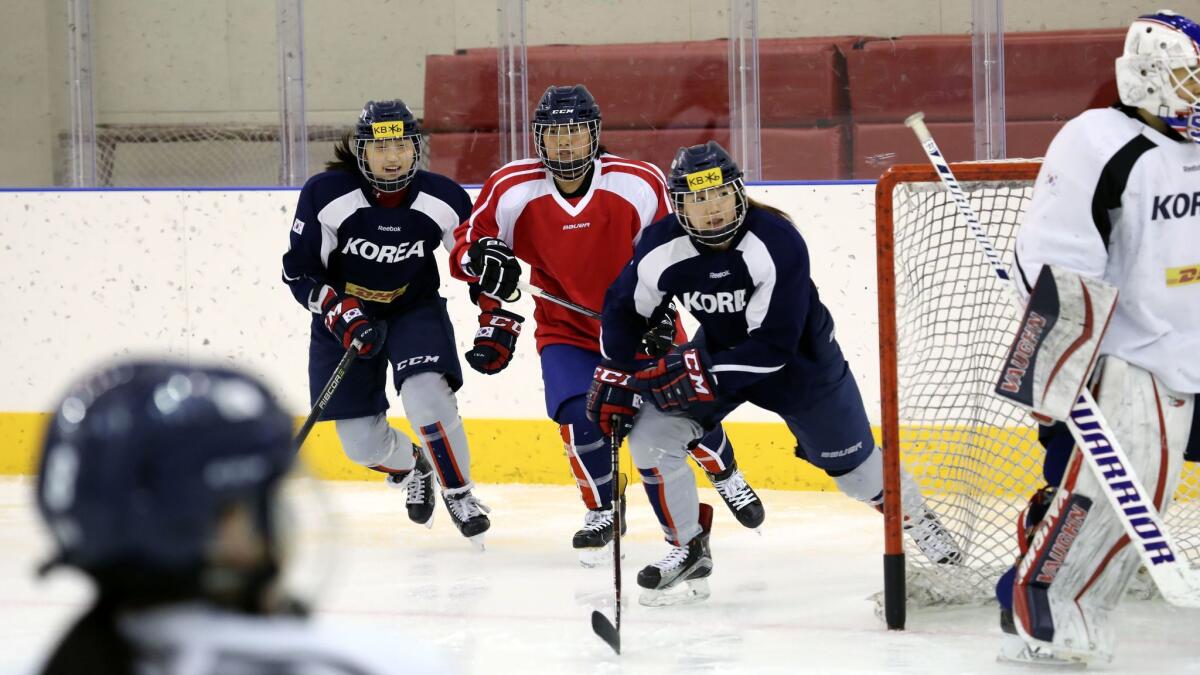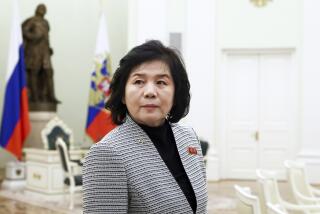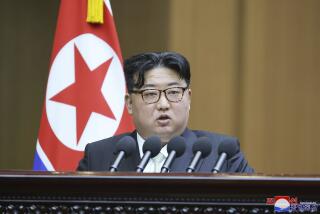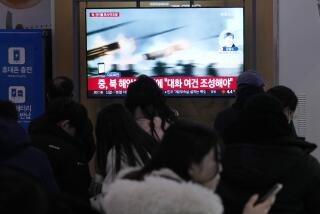North Korea shows uneasiness with South Korea after deal to cooperate during Olympics

The recent deal securing cooperation between North and South Korea in the upcoming Winter Olympics listed 19 specific pledges, including a combined hockey team, a unified march during opening ceremonies and shared cultural events.
One agreement negotiators didn’t ink, however, was how either side might react to media coverage.
North Korea — a totalitarian nation with state-controlled media — this week canceled a planned joint cultural event amid complaints about how media in the South — a democracy with a relatively freewheeling press — have covered the thorny issues still dividing the two nations.
The North’s objections focused on coverage in the South of a planned military parade in the North’s capital, Pyongyang. The parade was recently moved up to Feb. 8, the day before the Olympics open with the two nations marching together under a neutral unification flag.
The military parade serves as an ill-timed reminder in the South, whose leaders hope the Olympics might cool tensions on the peninsula, that the North remains a provocative neighbor intent on highlighting its emerging nuclear capability.
Recent stories about the parade reflected the deep skepticism among many in South Korea about the North’s motives — a fact that shouldn’t be a surprise to leaders in Pyongyang, experts say.
The thrust of this month’s historic agreement remains, and the North’s 22 athletes are still expected to compete. But the objection about media highlights the countries’ divergent philosophies and goals ahead of the Games, despite all the recent talk of peace and national solidarity.
“Let’s not have the unrealistic goal that North and South march arm in arm in the Olympics, and everything is fine,” said David Kang, an international relations professor at USC who directs its Korean Studies Institute.
So far, South Korean President Moon Jae-in and other officials in his government have shown what some observers consider restraint in response to the North’s actions during the last two weeks. In addition to moving up the military parade, the North made a surprise postponement of a location-scouting visit for musical performances in Gangneung, one of the Olympic host cities, and Seoul, the capital. The visit happened a day later.
The South’s Unification Ministry, which handles inter-Korean relations, called the cancellation of the cultural event at the North’s Mt. Kumgang “very regrettable.” The event was set to include pop stars and other musicians from the South, who were to perform with their counterparts from the North.
“The North and the South must fulfill agreements made on the basis of mutual respect and understanding,” the ministry said in a statement Monday.
The North’s official Korean Central News Agency, or KCNA, meanwhile, has lashed out in recent days at the South and the United States, a key ally to Seoul. Its caustic statements responding to complaints in the South and accusing the United States of seeking war have come with a mix of conciliatory messages too, leading to confusion about its position — a familiar enigma for North Korea watchers.
“It’s business as usual for North Korea,” said Martyn Williams, a writer for the North Korea Tech website who gets the nation’s media reports via a satellite feed to his San Francisco-area home. “That’s what they do all the time.”
The KCNA in recent days objected to people in the South who have criticized the Olympics deal, which includes plans to bring a large delegation of musicians, cheerleaders and tae kwon do demonstrators for cultural exchanges.
Some activists in the South recently gathered at a central train station in Seoul to protest what they derisively coined the “Pyongyang Olympics” — and the effort to combine the countries’ women’s hockey teams.
The group set fire to a North Korean flag and an image of leader Kim Jong Un, which resulted in the news agency labeling them as “top-class” traitors.
Such incidents in the South, which has a robust protest culture, could remain problematic if they continue during the Games. Other potential pitfalls, such as North Korean athletes being exposed to unapproved contact with media or people, also remain.
In addition to inter-Korean concerns, the North’s propaganda arms have turned their ire on the United States, issuing statements in recent days suggesting a plot to undermine the North’s Olympic participation. It’s another development that could spell trouble as Vice President Mike Pence visits the South next week.
Before Kim’s New Year’s Day comments about inter-Korean relations led to the Olympics breakthrough, his military and scientists oversaw numerous illegal ballistic missile tests and an underground nuclear detonation. Kim has bragged that his nuclear arsenal can now strike the U.S. mainland.
But the Olympics still have the potential to create an environment more conducive to dialogue.
Korea experts say that at least for the moment the focus should remain on the sporting and cultural milestones that remain from the deal — a shared march on Korean soil and the historic first of a combined Olympic team competing together.
“I don’t think the North Korean participation in the Olympics is in a precarious state,” said Go Myong-Hyun, a research fellow at Asan Institute for Policy Studies in Seoul. “What we have to do is look at the substantial issues. All this other stuff is ancillary.”
Stiles is a special correspondent.
More to Read
Start your day right
Sign up for Essential California for news, features and recommendations from the L.A. Times and beyond in your inbox six days a week.
You may occasionally receive promotional content from the Los Angeles Times.







